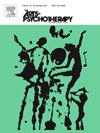A recovery-oriented approach to dance movement therapy in psychiatric rehabilitation: Exploring participants’ perspectives
IF 1.5
3区 心理学
Q3 PSYCHOLOGY, CLINICAL
引用次数: 0
Abstract
Recovery-oriented dance movement therapy (RODMT) is a specialized creative arts therapy approach designed for psychiatric rehabilitation. It uses expressive movement-based interventions as the primary means of conveying the recovery concepts of social support, goal development, and stress management to participants in an innovative and engaging manner. This study aims to portray the experiences of adults coping with severe mental illness before and after they participated in an RODMT group and explore RODMT’s potential to promote their personal recovery processes. In addition, detailed examples of RODMT interventions are presented to explain the unique amalgamation between dance movement therapy (DMT) and psychiatric rehabilitation. Five participants with schizophrenia participated in semi-structured interviews before and after the RODMT program. The interview data were coded, analyzed, and expert-reviewed for themes related to their experiences. Three main themes emerged from the thematic analysis: definition of recovery and personal goals, hindrances to recovery, and experiences from the RODMT group. The sub-themes included (a) improved functioning, (b) goal achievement, (c) frustration and dissatisfaction, (d) gaps between wanting and doing, (e) interest in and enjoyment from experiential activities, (f) awareness and application, (g) group support, and (h) embodiment and mind-body connection. Preliminary qualitative findings suggest that RODMT may contribute to participants’ recovery processes when implemented as part of recovery-oriented group treatment in psychiatric rehabilitation.
以康复为导向的精神康复舞蹈运动疗法:探讨参与者的观点
以康复为导向的舞蹈运动疗法(RODMT)是一种专门为精神康复设计的创造性艺术治疗方法。它使用基于表达的动作干预作为主要手段,以创新和参与的方式向参与者传达社会支持、目标发展和压力管理的康复概念。本研究旨在描述重度精神疾病成人在参与RODMT治疗前后的治疗经历,并探讨RODMT治疗对其个人康复过程的促进作用。此外,还提供了详细的RODMT干预实例,以解释舞蹈运动疗法(DMT)与精神康复之间的独特融合。五名精神分裂症患者在RODMT项目前后分别参加了半结构化访谈。对访谈数据进行编码、分析,并由专家对与他们的经历相关的主题进行审查。主题分析产生了三个主要主题:康复和个人目标的定义,康复的障碍,以及RODMT小组的经验。分主题包括(a)功能改善,(b)目标实现,(c)挫折和不满,(d)想要和做之间的差距,(e)对体验活动的兴趣和享受,(f)意识和应用,(g)群体支持,以及(h)体现和身心联系。初步的定性研究结果表明,当在精神康复中作为康复导向的团体治疗的一部分实施时,RODMT可能有助于参与者的康复过程。
本文章由计算机程序翻译,如有差异,请以英文原文为准。
求助全文
约1分钟内获得全文
求助全文
来源期刊

Arts in Psychotherapy
Multiple-
CiteScore
3.20
自引率
11.10%
发文量
66
期刊介绍:
The Arts in Psychotherapy is a dynamic, contemporary journal publishing evidence-based research, expert opinion, theoretical positions, and case material on a wide range of topics intersecting the fields of mental health and creative arts therapies. It is an international peer-reviewed journal publishing 5 issues annually. Papers are welcomed from researchers and practitioners in the fields of art, dance/movement, drama, music, and poetry psychotherapy, as well as expressive and creative arts therapy, neuroscience, psychiatry, education, allied health, and psychology that aim to engage high level theoretical concepts with the rigor of professional practice. The journal welcomes contributions that present new and emergent knowledge about the role of the arts in healthcare, and engage a critical discourse relevant to an international readership that can inform the development of new services and the refinement of existing policies and practices. There is no restriction on research methods and review papers are welcome. From time to time the journal publishes special issues on topics warranting a distinctive focus relevant to the stated goals and scope of the publication.
 求助内容:
求助内容: 应助结果提醒方式:
应助结果提醒方式:


